Google Declares War on Consumer Electronic Repair Service Centers
Timeline & Summary
- 31st August 2018 Google bans “third party technical support” from its advertising platform. This includes hardware repairs (computers, laptops, mobile phones) and the electronic service industry, even those with brick and mortar stores.
- 13th May 2019: After experiencing declining visibility for most major search terms, repair shops across the globe report the disapproval of adverts (including non-branded ad copy) due to “other restricted businesses”
- 6th September 2019: Still no verification program has been announced despite the claims made by Google’s David Graff that the program would be introduce “in the coming months”. It has now been over a year since the verification program was announced with no word from Google on the subject.
On the 31st August 2018 Google announced and implemented a new policy that restricts “third party technical support providers” from advertising on Google Ads. This resulted in a blanket ban of not just third-party technical support but also hardware service centres, most with brick-and-mortar stores. Computer, laptop, mobile phone, game console, and other consumer electronic repair services were all affected.
David Graff Director of Global Product Policy for Google stated “We’ve seen a rise in misleading ad experiences stemming from third-party technical support providers”. Many questioned the baby out with the bath water approach that was threatening the very livelihoods of those in the repair services industry due to decreased exposure from the search giant. Looking at the application of the policy, it is very unclear what Google’s true intent is. They have a very ambiguous written policy in place, but refuse to draw a line in the sand or address individuals’ concerns.
He also stated “That’s why in the coming months, we will roll out a verification program to ensure that only legitimate providers of third-party tech support can use our platform to reach consumers”. David’s statement offered hope that legitimate businesses caught in the cross-fire would return to the top of Google’s search results and not be grouped together with the undesirable tech support scammers that the policy was meant to be targeting.
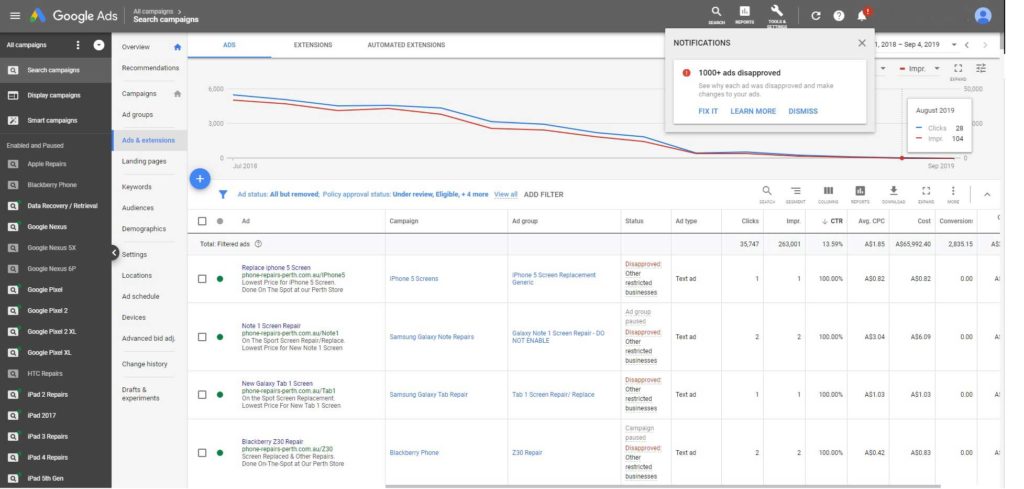
Businesses have experienced vastly reduced reach in Google Ads since the third-party repair policy change starting at the end of August ’18. We have over 1000+ Ads disapproved which has meant a drop from 5500 clicks in July ’18 (averaging out at 4500 clicks per month over the year) down to just 27 clicks in August ’19. PS. we had paused the campaigns during April ’19 period, hence the 0 clicks/impressions period in the graph.
Sadly, fast forward to over a year later and there is still no verification program. Google have been silent on the issue with tech support / repairers across the globe being kept in the dark about when the issue will be fixed, or if it will be fixed and why they were caught in the crossfire. This has led many to believe that Google ads for the repairs and services will not be coming back, or at least not anytime soon.
Furthermore tech support / repair forums became littered with reports from business owners that Google were disapproving their Ads. The Ads were flagged as “Third-party consumer technical support” and from within the Google Ads platform itself were listed as “Other restricted businesses”. Whilst some of the ads contain brand names many also contained no brand names at all, for example mobile phone repairs ad copy. There is still no word of a verification program, which would be essentially the same whitelist system that Google Ads had already rolled out for the locksmith industry to separate the scammers from the legit businesses.
And the ban seems to be still rolling out with repair shops reporting that their email inbox is being filled with notifications of ad disapprovals for the past week. It seems to be a trickle ban much like how Google had phased in the ban of certain search terms relating to repair, fix and support. Initially Google had just limited the visibility of major search terms like “computer repairs”, or “cell phone repairs”, but the banning of adverts themselves seems to be a move to up the ante. Banning all long-tail keywords for example would be a difficult task, because there are millions of possible combinations of search terms. The changing implementation of the policy means that Google have acted, but have not found the time to implement the promised verification process. This needs to be addressed.

The trickle advert ban has found advertisers receiving disapproved emails every hour or two. The ban is similar to the way Google phased in their keyword ban.
While to those outside of the industry this may seem of little importance, research firm IBISWorld estimates the global repair services generated about $19 billion USD in 2018 alone and employ almost 150,000 people. If you include the whole repair community including mechanics, agriculture & farming, data center technicians, and medical device repair that figure is closer to 4 million according to repair.org. Throw-away consumer electronics also have a huge environmental impact and as outlined by iFixIt in this article it is better re-use and repair, not just because of the inefficiencies of recycling methods, but because half of the 30 rare earth materials used in cell phones cannot be recycled!
Cory Farrugia President of RepairLift, a marketing company that solely offers their expertise to repair shop owners, addressed the community stating “lets assume they aren’t coming back online” asking the industry to instead focus on Facebook advertising and organic rankings. He also stated that “New accounts are almost impossible to get live”, a very real issue for new, upcoming businesses that would be at a competitive disadvantage against established businesses.
This has led many to speculate on the true intent behind the Google policy change including any possible collusion between tech giants Google, Apple, Microsoft and Samsung. The move also coincides with The Right to Repair Movement gaining more traction in the USA with bills being introduced in 20 States. Apple in particular have lobbied across the country attempting to kill any legislation that would make it easier for people to fix their phones, laptops and tablets and have access to genuine parts. The sponsor of a Right to Repair bill in Nebraska said she was told by Apple’s lobbyists that her the state would turn into a “Mecca” for hackers if the bill was passed.
They also have a vested interest in stopping third-party repairs. Whilst mostly known for the Google search engine, they also sell and manufacturer mobile phones under the Google Nexus and Google Pixel brands which have been quickly winning market share. Data from Adwords accounts show search terms containing Pixel keywords have seen reduced visibility since the policy change. Also ad copy containing “Pixel” terms have been disapproved due to “Third-party consumer technical support” since the policy change.
Google also partnered with repair chain uBreakiFix in the USA and Canada in order to provide a same-day repair service for their devices. Now, as the agreement specifics were not made public we can only speculate on the details but considering that Market Watch estimates that in the USA, alone screen repair cost consumers $3.4 billion USD, we can safely assume it would be a very large figure indeed. Furthermore, Google seem to be moving forward with in-house repair plans and according to Android Authority “the Google Store opened up its own “Repair Center” for customers to mail in their damaged Pixel and Pixel 2 handsets to be fixed”. You can find the Google repair store online now.
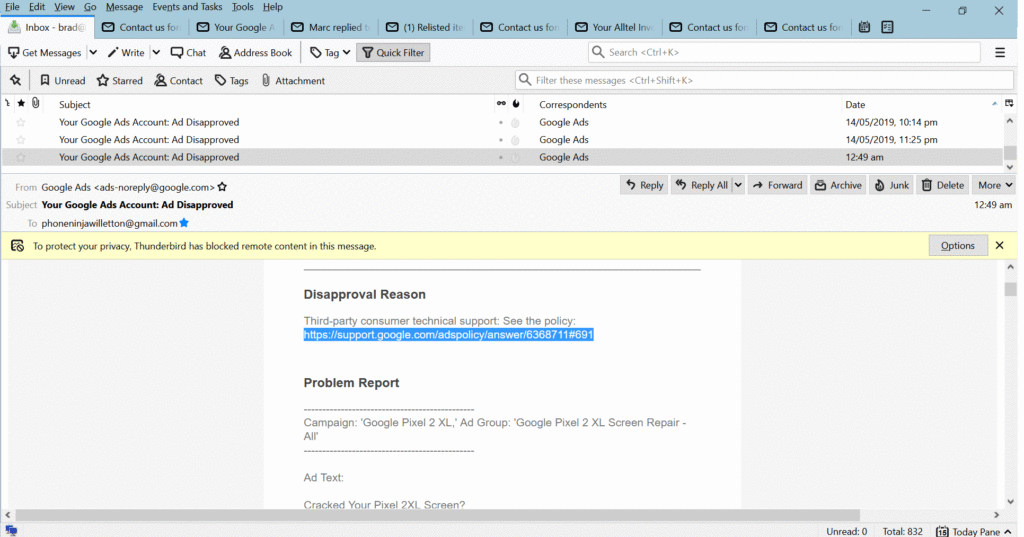
The Google Ads policy change also came a month before Google announced that they were partnering with Apple, a $12 billion dollar contract for one year according to Goldman Sachs, to remain as the default search engine on IOS devices. Apple have a long history of lobbying against the right to repair efforts and have even sued an independent repair professional in Norway. Right to repair activist and Youtube celebrity Louis Rossman had macbook batteries seized by US customs & Apple. As pointed out by Rossman, the batteries were for a device Apple no longer repairs because it is considered “vintage”.
In late 2018, Amazon, in an agreement with Apple, banned the sale of unauthorized Apple refurbished devices. Refurbished devices are devices that have been repaired and sold second hand, i.e. Macbook, iPhone. Aaron Perzanowski, a law professor at Case Western Reserve University and coauthor of The End of Ownership, said “Given Amazon’s dominance as an online retail marketplace, its decision to disregard the first sale rights of resellers will significantly limit consumer choice. The fact that this move was demanded by Apple makes it even more problematic. What we see here are the world’s two most valuable companies engaging in a coordinated assault on the lawful resale of consumer devices”.
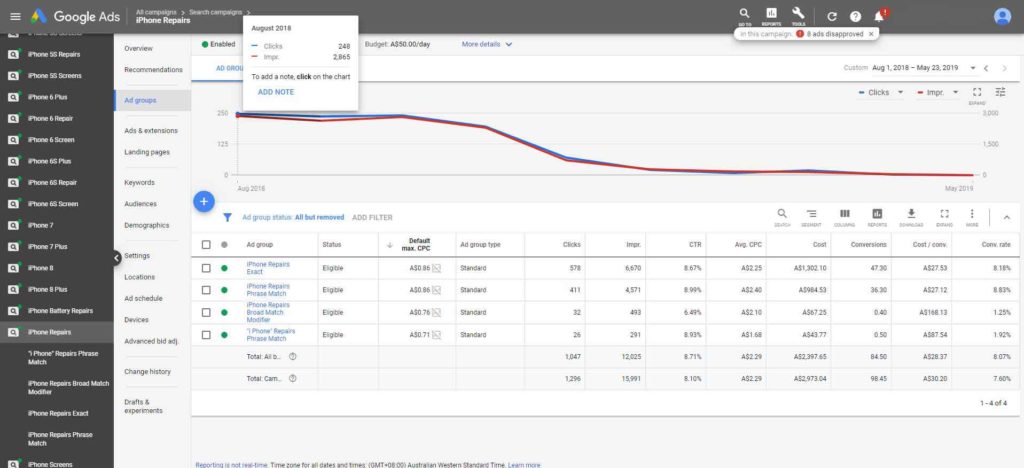
Sam Walker, CEO and co-founder of Fix2U, says that’ he’s in “panic mode” after the ban. In an article with news.com.au, he says that repair companies are being punished and shut off from potential customers. He has complained to the Australian Competition and Consumer Commission (ACCC) and started a change.org petition under the title “Dear Google, your knee jerk reaction is killing my industry”.
The ACCC have been a thorn in the side of tech giants having taken to court both Sony, over anti-competitive region-locking, as well as Apple who was ordered to pay $9 Million AUD in penalties because they misrepresented to consumers that because an iPhone or iPad had been repaired by a third party, that their warranty was void. The case had been brought to the ACCC’s attention because of the Error 53 scandal which disabled Apple devices after repair.
Charles Johnson, at Screen Remedy a repair store out of Houston Texas, found out first-hand that he would not be able to advertise with Google. In fact, he was told by an Adwords campaign specialist “In the next few months Google will rollout a verification process that will allow you to verify your business. Until that time there isn’t anything we can do run ads”. The email was dated Dec 20, 2018, more than 5 months ago and there is still no verification system.
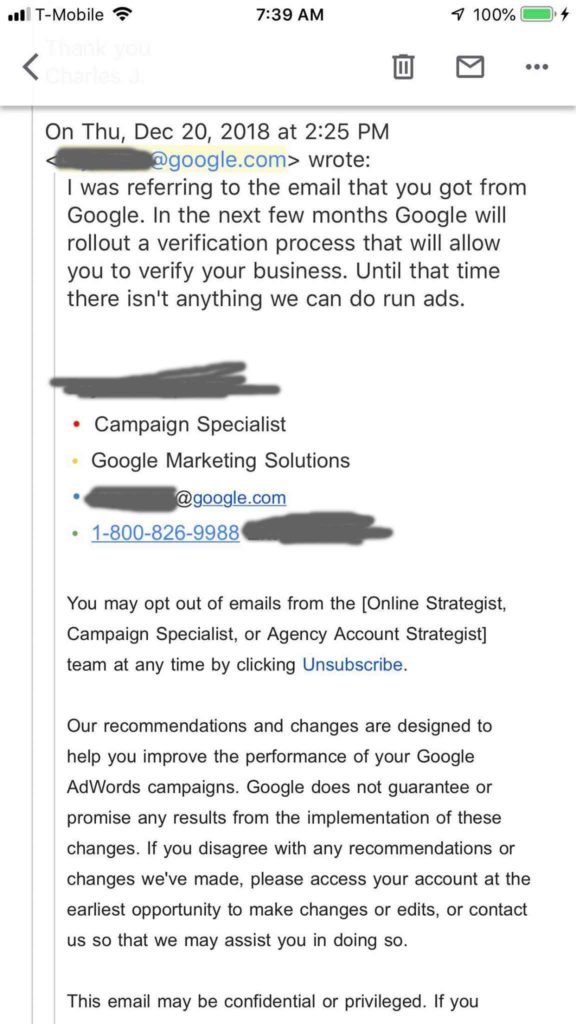
But should Google be required to even allow the advertisement of consumer product repairs on their search engine? They are a company just like those in the repair industry after all, aren’t they? Well for one, Google has maintained an almost 90% stranglehold of all global search traffic for the past decade. Their closest competitor Bing accounts for just 3.13% of all search traffic. Statista.com places Alphabet, Googles parent company, as the third highest valued company in the world behind only Apple and Amazon.
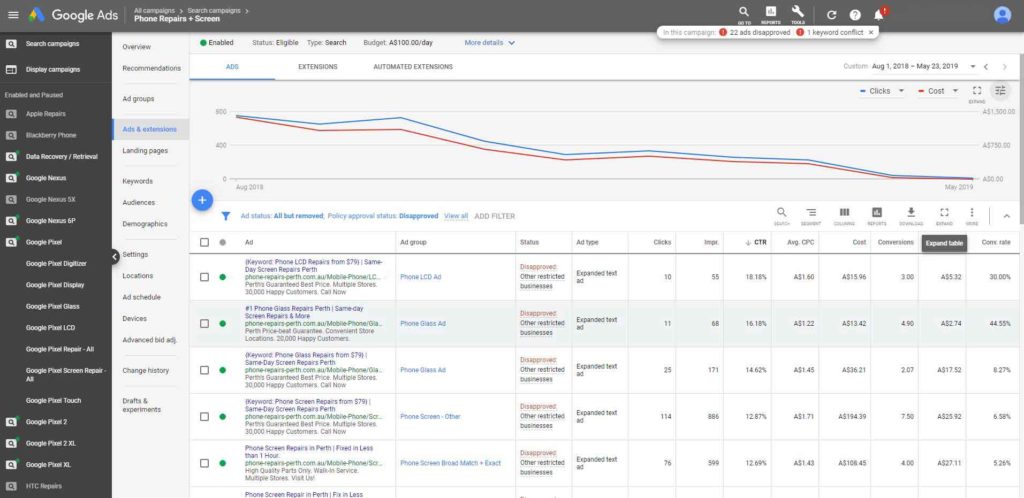
This has given Google immense control of information, and as information is power, great power comes with great responsibility. Therefore, do Google not have a moral obligation to provide information uncensored, and free of bias if that information is within the confines of the law? With control of information Google can bias news, push a political agenda, and control what hair care products pop up when searching.
Vested interests of Google and its partners also pose questions about anti-competitive practices, especially now that Google has established its own repair programs and are in direct competition with the repair industry. While it is true the majority of Google’s revenue comes from advertising, agreements between the tech giants are not public information and therefore we can only speculate on the details of these agreements. The absence of evidence is not evidence of absence.
For now, the Official Google Ads Community boards posts have been marked as “solved” and have been closed to new comments. Concerned repair businesses owners have been told to pause their Adwords campaigns, to privately contact Google for clarification, and to wait for an announcement. Nine months have passed though and still nothing; no announcements, and no clarification. Hopefully something will be announced next month but as time passes, so do hopes within the repair community. The War on Repair isn’t anything new to anyone in the industry, but for many this might be the straw that broke the camel’s back.
For those in the industry, you can file a complaint with Google at https://support.google.com/google-ads/contact/aw_complaint The more complaints Google receives the more likely it is that the industry can push back against Google’s policy change.
We were contacted by a Google Ads specialist after submitting a complaint. We were told to remove all mention of brand name repairs from our website. When asked why non branded search terms like “phone repairs” were not displaying and non-branded ads were disapproved the specialist had no comment. We also asked about the verification program which the specialist was unaware of, instead deciding to repeat that we should remove repairs from our website.
Thankyou to the the Endadget Team (especially Editor Daniel Cooper) who referenced us in their recent article “Thank Google for making it harder to find a phone-repair service“.

UPDATE 24/5/19
For those in the industry, you can file a complaint with Google at https://support.google.com/google-ads/contact/aw_complaint The more complaints Google receives the more likely it is that the industry can push back against Google’s policy change.
UPDATE 27/5/19
We were contacted by a Google Ads specialist after submitting a complaint. We were told to remove all mention of brand name repairs from our website. When asked why non branded search terms like “phone repairs” were not displaying and non-branded ads were disapproved the specialist had no comment. We also asked about the verification program which the specialist was unaware of, instead deciding to repeat that we should remove repairs from our website.
It’s not just repairs though, it’s call consumer technical support. The Google Ads reps don’t understand how the police, or the algorithm that enforces it works.
‘fix’, ‘help’, ‘support’, ‘repair’ all have to go. How do you tell people you can er.. make their computer do things in a way that is not how you don’t want them to work?
We just need the media to care, so Google is forced to pretend it feels bad and hurry up with the verification program.
Agreed it’s all third party consumer technical support & repairs. It’s absolutely impossible for us to not use these terms. I have contacted a few journalists, nothing solid yet but a few are interested in running stories on the topic.
Just two block away, from my shop there is a guy who runs exact ads like mines.All of his ads works but all my ads stop working 3 weeks ago.He is telling me that he has a lot of work to do at the moment. if soon there is no verification program, then probably i will have to sell my shop to him.
This is so unfair google!
It’s new financial year now. How is the verification program going? Any update?!
I have the same problem and I rely on the google ad to run my business. I have totally lost.
Thankyou to the the Endadget Team (especially Editor Daniel Cooper) who referenced us in their recent article “Thank Google for making it harder to find a phone-repair service”: https://www.engadget.com/2019/08/09/google-repair-ads/
yeah thats really bad. we too have a few that have circumvented the system who are still advertising. I heard that it in the USA bestbuy and batteries plus are still allowed to advertise as well, giving them a huge advantage over their smaller competitors
Nothing at all York Yang. its been over a year now since Google announced their would be a verification program. Nothing yet has been reported from anyone in third party repairs industry.
We are coming up to one and a half years since Google started disapproving almost all electronic repair advertising. I have noted in some searches there are ads from businesses in Australia that I compete with.
When contacting Google Adwords to ask if I can advertise the same service, they say they no and they will remove the competitors ads instead. Yet i still find competitors ads running even today. Google appears to be engaging in anti-competitive behavior.
I have been lodging complaints with Google Adwords and I am currently lodging complaints with the Australian Competition and Consumer Commission over Google’s ongoing behavior.